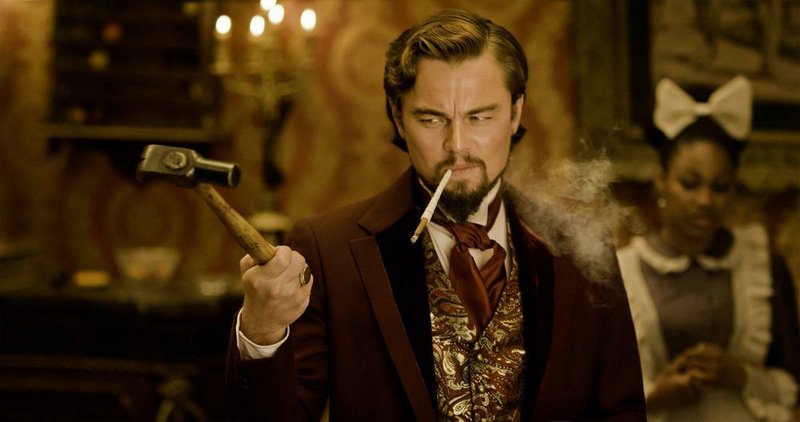LITTLE ROCK — Django Unchained
85 Cast: Jamie Foxx, Christoph Waltz, Leonardo DiCaprio, Samuel L. Jackson, Kerry Washington, Walton Goggins, Dennis Christopher, Don Johnson, Franco Nero, Russ Tamblyn, Amber Tamblyn, Tom Wopat, Bruce Dern Lee Horsley, Jonah Hill, Don Stroud, Ted Neeley, Michael Parks Director: Quentin Tarantino Rating: R, for strong graphic violence throughout, a vicious ÿght, language and some nudity Running time: 165 minutes
To make a successful revenge thriller, you have to be a significant sadist. You need to put your protagonists in direct harm’s way, take away their families and loved ones, torture them, get them incredibly close to their goal only to snatch it away from them again and again, and all against horrible, compassionless, evil forces that stack the odds entirely against them.
Fortunately, when it comes to sadism, few American directors offer a more direct line into their twisted psyches than Quentin Tarantino, who not only makes his heroes suffer, he takes them to dangerous depths of depravity and degradation in the process.
This, in itself, isn’t intended as a negative: Tarantino has always understood the laws of dramatic narrative that flatly state: The greater the peril and anguish you visit on your audience, the better and more fulfilling payoff you give them at the end when the hero still triumphs.
In that regard, Tarantino has few peers. His films have always joyously danced beyond standard boundaries of taste and audience expectation — think Mr. Blonde’s ear-cutting scene in Reservoir Dogs; the shuddery mysteries of the Gimp in Pulp Fiction; and Beatrix Kiddo being buried in a coffin in Kill Bill: Vol. 2.
His new film, which concerns a freed slave turned professional bounty hunter on a vicious quest to reunite with his beloved wife, spares no expense of fake movie blood, and allows Tarantino to gleefully pour his particular brand of imaginative hyper-violence all over slave-runners and plantation owners of the deep South just before the Civil War.
Django (Jamie Foxx) is initially freed by Dr. King Schultz (Christoph Waltz), a German bounty hunter with a strong abolitionist streak and charmingly dulcet way with words (“Good cold evening, gentleman! Amongst your inventory, I’ve been led to believe you possess a specimen that I am keen to acquire,” he opines upon first encountering Django’s captors). He goes on to take Django under his wing, teaching him the various tricks of the trade during their travels, while making several important kills, all in preparation for returning to the South in order to free Django’s wife, Broomhilda (Kerry Washington), from the clutches of evil plantation owner Calvin Candie (Leo DiCaprio, with fancy whiskers and a gantlet of dirty, stained teeth), who presides over his roost with the help of his boisterous majordomo, Stephen (Samuel L. Jackson).
The duo initially launch a plan to extricate Broomhilda without bloodshed and fuss, but when that goes predictably awry, the film concludes with a blood-soaked, takeno-prisoners battle royale (not, it must be said, without cheese).
Along the way, Django is burned, branded, whipped, strung upside down naked and beaten more than half to death. But you should see the other guys.
Tarantino has always enjoyed putting his protagonists through the proverbial wringer before releasing them into their victory denouements, but here he has an entire sordid and ruthless history of white American racism and cruelty from which to draw, an opportunity he simply can’t pass up.
As always, he does all this with an ever-surprising comic verve (a long digression among would-be Klansmen and the difficulty of trying to perform a raid wearing hoods with badly cut-out eyeholes is an extended gag for the ages) and a wicked delight at extending long, quasi-philosophical theses into tightly structured tension-builders.
Given the opportunity to play with so many of his pet bugaboos at once — race, violence, downmarket ’70sera film techniques, Samuel L. Jackson — you get the impression Tarantino is almost giddy with the possibilities set before him. He’s having such a good time, he even pokes some fun at his own unruly image, playing a small role as an Aussie thug who meets a colorfully over-thetop demise.
The thing is, Tarantino has always strained to have his blood-soaked cake and eat it, splashing around in the dirty genre pool even as he gives his characters long orations about comic book literary theory, French fastfood customs, and whatever else might be lurking in his mind. As much fun as he has here clowning with the slave/ master dynamic, it’s still a bit disconcerting to see a white director playfully toy with the conventions of one of the most bleak and amoral times in our country’s history.
So carved out of irony are his compositions, he can always hide behind one intellectual rubric or another, pointing out how all his films twist convention to serve his purposes. The problem is, in that process, he reduces everything — slavery, Nazis, misogyny — to a Tarantino production, rendering everything in his particular off-kilter vision without ever having to answer to anyone for the choices he makes. “Kill white people and get paid for it?” Django asks incredulously of his new-found business partner. “What’s not to like?”
The other nagging issue is his manner of appropriation of his favorite films, be they ’70s-era martial arts epics, “blaxploitation” flicks, or grindhouse horrors. He’s not making one of the films he loves, in other words, he’s making an hommage to the films he loves, a distinction that shrouds the whole enterprise in an extra layer of artistic detachment. They might be near and dear to his heart, but they aren’t from it. Let’s face it: For all his wit and visual/structural panache, as a filmmaker he’s a bit of a tourist.
MovieStyle, Pages 27 on 12/28/2012

